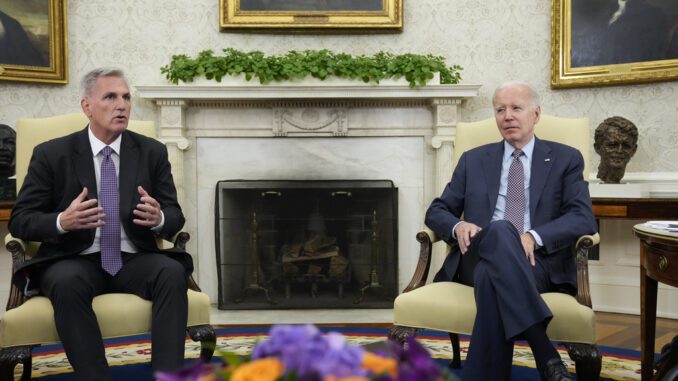
The agreement negotiated by President Joe Biden and Speaker Kevin McCarthy to temporarily suspend the federal debt limit and establish caps on appropriated spending has passed through Congress. The legislation averts a U.S. government default and the economic catastrophe that would have resulted from it. While the deal was essential to resolve a short-term crisis, it doesn’t address the underlying problem that brought it about. Federal finances remain on an unsustainable trajectory, and this legislation does not correct that. Accordingly, similar crises will recur until lawmakers seriously confront the drivers of rising federal debt.
Voters are too frequently misled about the causes of federal debt. Partisan politicians promote myths, dutifully parroted by media allies, that appeal to their target voters. The myth on the left is that deficits exist because the wealthy get away without paying their fair share of taxes. The myth on the right is that ending the Biden administration’s spending spree will fix the problem. Neither is true.
The actual cause of runaway debt is one neither party sees political advantage in recognizing: namely, the exploding cost of the largest mandatory spending programs of Medicare, Social Security, Medicaid and so-called Obamacare. It is almost entirely a problem of spending growth: fully 83% of the federal fiscal imbalance arises from legislation increasing spending. Every bit of that growth over the long term is attributable to these four programs alone.
Nearly three-fifths of the long-term fiscal imbalance — or 59% — was legislated within just a few years, from 1965 to 1972. During that period, Medicare and Medicaid were enacted, both programs were later expanded, and Social Security was also dramatically expanded and subjected to new automatic growth mechanisms. These programs’ spending growth occurs automatically in the absence of intervening votes by lawmakers and substantially outpaces the growth of U.S. economic output. Lawmakers have yet to determine how to moderate these programs’ growth rates to sustainable levels.
Of course, other legislation can and does temporarily increase federal deficits. Federal spending skyrocketed in response to the 2008 financial markets crisis and the global pandemic that began in 2020, while virtually every recent president has overseen a tax cut of one magnitude or another. But federal deficits continue to metastasize despite tax collections today exceeding historic averages as a share of the U.S. economy, and after other spending surges have concluded. Even when taxes are higher than normal and other spending is lower than normal, the growth of Medicare, Medicaid and Social Security still drives mounting deficits.
These realities are immediately visible to anyone who reads the publications of the Congressional Budget Office, which stress these deficit drivers in every long-term budget analysis. Given this information, why do so many believe that other aspects of the budget, such as tax policy, play a much larger role than they actually do?
The answer is that politicians amplify their disagreements for messaging purposes while downplaying policy challenges that fail to offer political advantage. Moreover, it is extremely easy for partisan advocates to generate reports with predetermined conclusions — usually, that the other side of the aisle is to blame.
A common tactic is to look only at policies enacted after the other side came into office, excluding from view any decisions made before that date. For example, 62% of the federal fiscal imbalance was enacted prior to 2000, all of this legislation consisting of provisions that automatically increase spending. Deliberately confining one’s view only to policies enacted after 2000 increases the share of responsibility attributable to tax cuts from its actual 17% to an illusory 45%.
In the real world, lawmakers don’t have the luxury of ignoring the major drivers of the fiscal problem simply because of when they were enacted. If, for political reasons, lawmakers only focus attention on aspects of the budget that matter very little, ignoring aspects that matter most, federal finances can never be stabilized.
The package emerging from Congress will temporarily cut annually appropriated spending, just as many previous budget agreements have done. But it won’t do much to fix the underlying problem because that’s not where persistent spending growth has been. As long as American voters indulge the left’s fiction that the problem is insufficient taxation and the right’s fiction that spending can be contained without touching the fastest-growing programs, the future will only present more fiscal crises.
Charles Blahous is the J. Fish and Lillian F. Smith chair at the Mercatus Center and a visiting fellow with the Hoover Institution.



